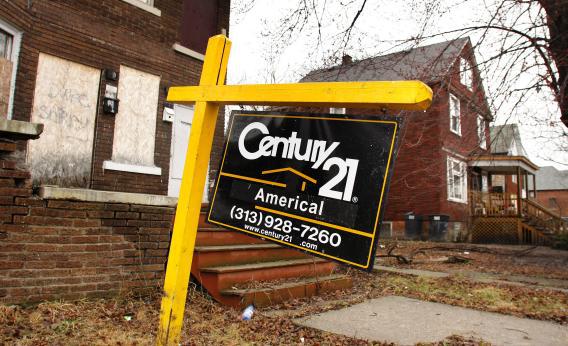Many households have a worse credit rating in 2013 than they did in 2008 as a result of a financial crisis and a very severe recession. And many banks have stricter lending standards in 2013 than 2008. Consequently, for many households it’s challenging to get a mortgage. And yet people need to live somewhere, and in at least some American markets, there are lots of houses around thanks to overbuilding in the mid-aughts. What the economy needs to equilibrate is investors or fund managers with large pools of cash at their disposal to purchase these houses and operate them as rental properties. And increasingly it’s happening. But media coverage of this phenomenon seems to me to be full of unjustified negative affect, like Robert Russo complaining “the investors are making it hard for a regular homeowner to buy a property” because “they are getting outbid by people with cash.”
Another way of putting it would be that we’re finding a way around post-crisis credit constraints and evolving to find a way to operate a housing sector that’s less dependent on leverage.
Or Jack McCabe says, “There is the possibility that Wall Street and the banks and the affluent 1 percent stand to gain the most from this,” while “lower-income Americans will lose their opportunity for the American Dream of building wealth through owning a home.” The more sensible account would be that if the past 10 years have taught us anything, it’s that having a large leveraged bet on your own house as far and away your household’s biggest investment is actually a terrible asset-building strategy. Homeownership has its advantages, but unless you have substantial additional financial assets, it means you have a very risky and very undiversified investment portfolio. Lower-income Americans would likely be better off living in rental housing and making sure to buy up some broad index funds than trying to play amateur real estate speculator.
My view is that far and away the most reasonable worry about the new investor-owned single family rental property fad is that it’s going to be a disaster for the investors. There’s no real precedent for the large-scale operation of single-family-homes-as-rental-housing as a business, and I think it’s very possible that it won’t work. Having people live in dilapidated, mismanaged, and ill-maintained suburban subdivisions is better than having them be homeless, but it’s much worse than housing people in structures that are purpose-built to be maintained as rental properties. What we really need is a relaxation of zoning curbs on multifamily construction, so as we shift back into a lower equilibrium level of homeownership, people can have decent places to live.
